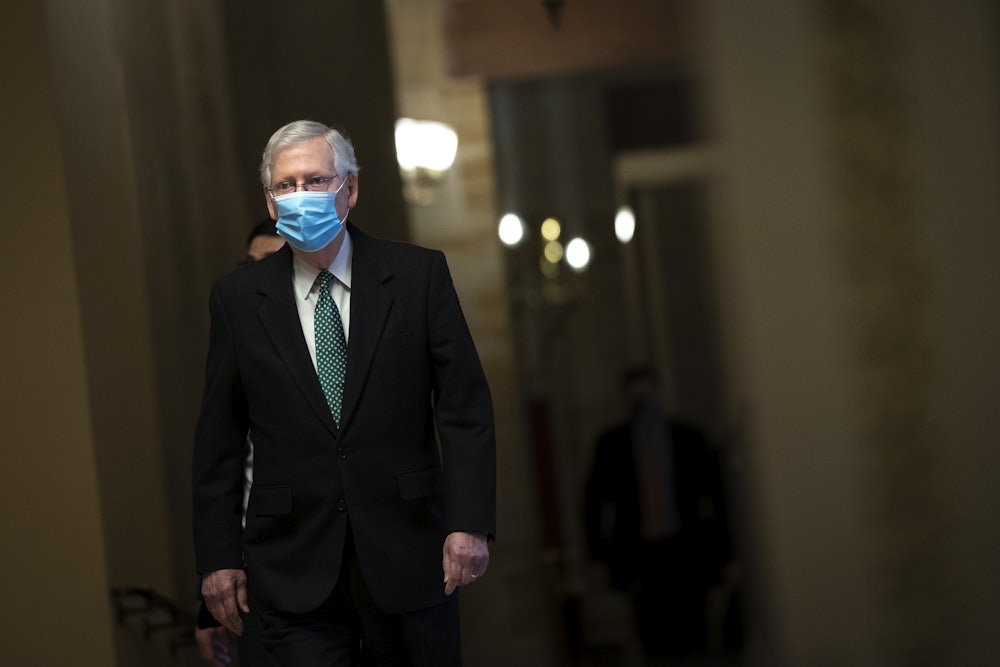Cartoonist Al Capp, famous for the twentieth-century comic strip Li’l Abner, created a visually memorable character named Joe Btfsplk who walked around under his own rain cloud. That mood of persistent gloom afflicts the Democrats these days, even though Joe Biden is in the White House and the party holds shaky majorities in the Senate and the House.
Their laments are familiar and a tad self-pitying. The Senate, by giving each state two seats, is biased against the Democrats. (Good luck blasting that out of the Constitution.) So is the Electoral College, which overly rewards voters in smaller conservative states. And the Republicans will be able to use the filibuster, the most potent weapon in Mitch McConnell’s arsenal, to block all of Biden’s major legislative goals.
This web of woe has distracted many Democrats from what is happening within the Republican Party. The GOP is in the midst of the most dramatic meltdown of any political party since the Democrats bitterly split over the Vietnam War. As he festers in fury at Mar-a-Lago, Donald Trump is wreaking havoc on his party, jeopardizing Republican chances of taking control of Congress in the 2022 elections.
Democrats were so disappointed that only seven Republican senators voted to convict Trump that they have failed to grasp the significance of how many legislators turned on the Inciter in Chief as soon as impeachment was over. Sure, these after-the-fact attacks seemed like a cynical effort to rewrite history, but they were also major salvos in an intraparty feud. McConnell himself, having safeguarded his right flank by voting to acquit Trump, immediately reversed field in a blistering Senate floor speech to assure corporate donors that the entire Republican Party was not yet a wholly owned subsidiary of QAnon. Other influential senators joined in the anti-Trump onslaught. West Virginia’s Shelly Moore Capito declared in a blunt statement, “The actions and reactions of President Trump were disgraceful, and history will judge him harshly.”
OK, Capito was just reelected to a six-year term, albeit from a state that Trump carried by a two-to-one margin. But John Thune, who holds the number two post in the Senate GOP leadership, is on the ballot in 2022 from the equally conservative state of South Dakota. Thune told Politico in a recent interview, “At the grassroots level, there’s a lot of people who want to see Trump-like candidates. But I think we’re going to be looking for candidates that are electable.”
Needless to say, “electable” is a euphemism for candidates who don’t believe that antifa orchestrated the January 6 assault on the Capitol and that school shootings are false-flag operations staged by Democrats. The problem from a GOP perspective is that the party can’t figure out how to win the 2022 elections with Trump—or without him.
While
the Democrats have embarked on a major autopsy to analyze why the
party fell short in seemingly winnable Senate and House races, Trump’s stranglehold
on the Republican coalition means that there has been no organized effort within
the GOP to understand why the party lost the White House and the Senate in 2020. Many
Republican leaders are publicly clinging to the absurd position that the 2020
election was stolen. GOP voters are even more firmly rooted on Planet
Irrational: A new Suffolk University/USA Today national poll found that 73 percent of
Republicans believe that Biden was not legitimately elected.
The cupboard is also empty when it comes to fresh conservative ideas. We are moving into our second decade of waiting for a workable Republican health care plan to replace Obamacare. All voters seem to hear from most Republicans in Congress are variants of the Fox News talking points: “The caravans are coming across the border” and “What about the Black Lives Matter protests?” The Trump hangover means that the GOP stands for nothing beyond fidelity to the extended First Family of Grifters. It is telling that the congressional Republicans cannot even muster an alternative to Biden’s $1.9 trillion stimulus package other than a thunderous “no.”
The difficulty in deciphering the lasting effects of the pandemic on our politics adds an important caveat to all political predictions. As Republican strategist and pollster David Winston rightly puts it, “One thing our political system doesn’t react well to is huge-scale sociological change. And we’re right in the middle of it.” But in the short term, the omens do not look propitious for the Republicans. With the pandemic easing, the economy seems poised for a dramatic takeoff. According to a new survey by the Conference Board, 82 percent of corporate CEOs expect an uptick in the economy over the next six months. That’s the most dramatic statement of business optimism in the survey since 2004. The tragedies that have accompanied the massive power failures in Texas suggest that swing voters may be reluctant to ever again put the Republicans in charge of the electrical grid.
The fissures among Republican voters makes the GOP look like the scene after an earthquake. This Sunday, Trump will return from Elba to address the right-wing CPAC convention in Orlando, Florida. While predicting the precise turns of a Trump speech is as difficult as guessing what Ted Cruz will do next to humiliate himself, it is a safe bet that the defrocked president will not be pitching Republican unity. Yet the hunger for Trump endures: 59 percent of GOP voters in the Suffolk/USA Today poll want Trump to run again in 2024. Meanwhile, traditional conservative Republicans feel increasingly uncomfortable in their own party. A Gallup poll, conducted earlier this month, found that only 78 percent of self-identified Republicans have a favorable view of their own party, which is a dramatic 12-point drop since the election.
There is a risk in overreacting to numbers like these. Karlyn Bowman, a polling analyst at the American Enterprise Institute, explains, “I think we have to see where things are headed. Party ID tends to bounce around. But it has been a bad few months for the Republicans.”
Predicting congressional elections 20 months in advance is also a fool’s game. But fidelity to Trump is, at minimum, complicating Republican efforts to win back the Senate. A delayed census report means that we do not yet fully understand how many House seats the Republicans may gain from redistricting.
The battle lines are obvious, though, for the Senate. The Republicans have an opportunity to pick up seats in Georgia and Arizona, since fledgling Senate Democrats Raphael Warnock and Mark Kelly were only elected to two-year terms. But Trump’s vicious feuds with the Republican governors of both states makes a mockery of unified GOP Senate campaigns. In Ohio, Trumpism has also forced popular GOP incumbent Rob Portman into retirement. While tilting Republican in recent elections, Ohio tends to reward mainstream GOP candidates rather than hard-right fanatics. But the top contenders for the Republican Senate nomination are vying to prove they are more loyal to Trump than Rudy Giuliani, a stance that may not play well in the 2022 general election. For example, former Ohio State Treasurer Josh Mandel, in his third race for the Senate, thundered, in declaring his candidacy for Portman’s seat, “Watching this sham and unconstitutional impeachment has made my blood boil and motivated me to run for U.S. Senate.”
This spectacle of reverent Trump worship should not send Democrats off in a burst of irrational exuberance. But it does suggest that built-in liberal pessimism is similarly misplaced. The lesson of Barack Obama’s first term—do everything in a rush because you are destined to lose your congressional majority after two years—may have overly influenced many Democrats. With the Republicans in free fall, a strong case can be made that these 2010 Obama parallels no longer automatically apply. And, unlike the Trumpian and nontriumphant Republicans, the Democrats may be poised to prosper throughout the decade as a big-tent party.








